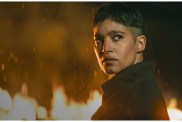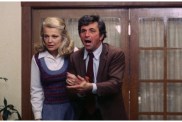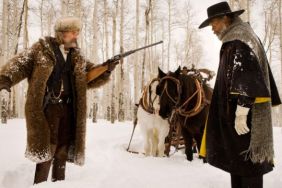
A mute gunfighter by the name of Silence (played by Jean-Louis Trintignant star of the Oscar-nominated Amour) lives by a code that he won’t shoot a man until that man draws on him first. This code is put on display as a group of bounty killers lay in wait and Silence guns them all down except one. This one, comes running out from behind a tree, surrendering, asking Silence not to kill him saying he’s through with bounty hunting. Silence obliges by shooting off his thumb, guaranteeing he’ll never pull a trigger again. In the first three minutes, director Sergio Corbucci has given us a character we want to now a lot more about.
Corbucci’s Django was one of the many inspirations for Quentin Tarantino‘s Django Unchained, but as much as the film’s title character may have come from Django, inspiration was found in plenty of other films, many of which Corbucci features. Corbucci’s The Great Silence (Il grande silenzio) is one such film, containing similar themes of class warfare and the long arm of the law serving as anything but a protector of the less fortunate.
Silence’s code gives him freedom to kill in “self-defense” and as much as that may protect him from the law, it also proves to be a weakness against less morally driven characters. One such character is the bounty killer Loco played by the great Klaus Kinski who is probably best remembered for his collaborations with Werner Herzog. Here, Kinski turns in a performance as a heartless killer with the kind of verve and zeal we’ve come to expect.
Loco, as it turns out, isn’t necessarily working outside the law either. He’s using it to his advantage just as much as Silence, only difference is he’s profiting off his killing. The poor people occupying the small town of Snowhill, Utah have been forced to steal to remain alive, but for their crimes bounties have been placed on their heads by an inept sheriff and corrupt local politicians.
While carrying out his duties as a bounty hunter, Loco’s lust for killing is sated and he’s making off with handfuls of money while he’s at it, that is, until the wife of one of his victims is unwilling to take the killing sitting down.
Hired by the widow to take out Loco, Silence finds himself in a situation with a man not entirely unlike himself in terms of their methods, but the blood running through their hearts is very much a different story.

Beyond the politics and moral conundrums the film presents, it is most likely remembered for its ultra-bleak ending, which I was not at all prepared for. Tarantino, writing for the New York Times in advance of the release of Django Unchained describes it as follows:
And Il Grande Silenzio has one of the most nihilistic endings of any western. Trintignant goes out to face the bad guys — and gets killed. The bad guys win, they murder everybody else in the town, they ride away and that’s the end of the movie. It’s shocking to this day. A movie like [Andre de Toth’s] Day of the Outlaw, as famous as it is for being bleak and gritty, is practically a musical in comparison to Il Grande Silenzio.
Silenzio takes place in the snow — I liked the action in the snow so much, Django Unchained has a big snow section in the middle of the movie.
Tarantino mentions de Toth’s Day of the Outlaw, which I also watched in preparation for this Movie Club entry and Tarantino hits it on the head when comparing the two films. In fact, reading Corbucci was inspired by Day of the Outlaw when he was writing The Grand Silence had me expecting something far darker. For as bleak as Day of the Outlaw is, and as much as the themes find similarities, the snowy setting stands out more as a comparison than the dark nature of the two stories.
Speaking of the snow, I was also reminded of a recent Movie Club entry while watching as I simply couldn’t get comparisons to Robert Altman’s McCabe & Mrs. Miller out of my head, both for the cold and icy setting, but once again, the themes and dark nature of the story.
One of the criticisms leveled at Tarantino’s Django Unchained was to say his homage to the spaghetti western didn’t hold nearly the number of political and current day themes many of Corbucci’s films featured. Instead many believed he was merely drawn to the look and violence of these films. I disagree with the people that believe Django Unchained is merely blood, bullets, funny one-liners and eccentric characters, but I welcomed the opportunity to see more of what Corbucci’s films offered than I may have otherwise been looking for.
The Great Silence delivers in many ways, as a piece of entertainment and as a conversation starter with to discuss from the moral ambiguity of Silence’s code and the question of whether or not he is any better than Loco, as he too was operating within the laws of the land. It’s a question of what hath God wrought? Silence is the child of murdered parents and his revenge is palpable. He hides behind a code, but does that make him any better than Loco? Our path shapes and molds us. In the case of Silence, has it blackened his heart to a place where there is no coming back?
In terms of the spaghetti western, by the time the last bullet is fired, it has turned the genre on its head in blood red reality.
I do wonder, however, what came first, the name of the character or the name of the movie. There are stories out there that Trintignant didn’t want to learn any lines for the film and thus none were written. The Wikipedia entry for the film then says Corbucci considered the muteness of Trintignant a joke. “Because a western hero never talks much, Corbucci exaggerates this genre-typical must and depicts the main hero as a mute.” Can it be both at the same time?
In the film, the widow that hires Silence says he got his name because of the silence of death that follows him? Is that so, or did he get it because Trintignant didn’t want to learn any lines or because Corbucci meant it as a joke? Perhaps this is a mystery we’ll never solve.
NOTE: Below is an alternate ending to the film that I guarantee you will not prefer to the actual ending.
DISCUSSION RULES
The rules are simple and, if necessary, will update as we go along.
- No topic is off limits as long as it pertains to the movie of the week or comes as a natural progression of the conversation.
- Keep your comments to a reasonable length. I know the urge to write a lot at once is there, but try to rein it in and get out one thought at a time. That way the conversation will move more fluidly and make sure none of your thoughts are overlooked.
- NO BULLYING: This is important, while you are free to disagree, do so in a mature manner. Hopefully I won’t have to explain that any further.
- Suggestions for future Movie Club titles must be emailed to [email protected]. Comments on actual Movie Club articles pertaining to future discussions and not the film being discussed will be deleted to make sure we remain on topic.







